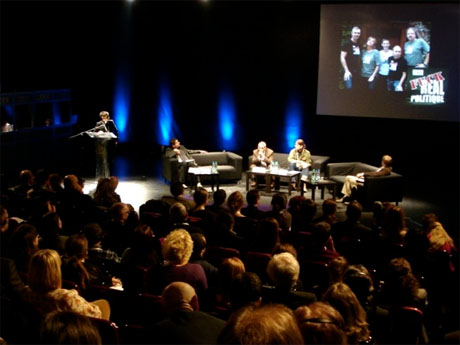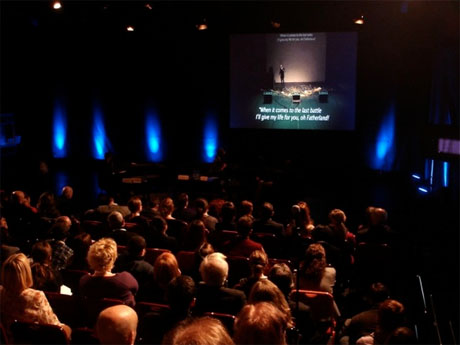Natallya Kalyada: “We regularly encounter cynicism of European officials”
- 17.12.2009, 12:58
December 11-12, a wide-representative International Conference “Go East. Culture and Civil Society. Eastern Partnership in Practice” was held in Warsaw.
Leaders of the Free Theatre Natalia Koliada and Nikolai Khalezin represented Belarus, dramaturg.org website informs.
The conference was attended by representatives of about two dozen countries, the absolute majority of whom were from the states, included in the program of the Eastern Partnership: Ukraine, Belarus, Armenia, Azerbaijan, Georgia and Moldova.
At the conference much attention was paid to the dissemination of EU programs aimed at addressing the problems of cooperation of the EU countries with the Eastern Partnership states. Much attention was devoted to discussion of practical problems: the lack of channels of information exchange; issues related to cultural differences; lack of effective solution of problems related to the Schengen visa support.
In her speech, the representative of Belarus Natalia Koliada sounded reproach to the European structures, which, in fact, had not initiated a single global cultural project in collaboration with non-governmental Belarusian cultural initiatives limiting its work to the implementation of projects with the official cultural institutions.
Commenting on this thesis, Natalia Koliada said in an interview: "We are facing the cynicism of European officials on a regular basis. They are following the line of the least resistance, not wanting to interfere with the current Belarusian authorities, and refusing to cooperate with the independent Belarusian writers, artists, musicians, who are subjected to pressure in their country. Eventually, European audiences have a distorted view of the Belarusian culture and the Belarusian delegation at the present conference is the smallest one”.
Nikolai Khalezin an artistic director of the Free Theatre said answering the question of why so much attention at the Conference was devoted to questions of visa support: “Until recently we believed that the visa problem was a local problem of Belarus, but it turned out that this was a problem of all Eastern European countries outside the Schengen zone. Our colleagues from Georgia, Azerbaijan or Ukraine are facing the same problem. Whatever your status is in your homeland, you are initially perceived by European foreign ministry structures as a criminal. For such a simple thing as a visa, you must demean yourself and grovel endlessly, to justify and prove that you are not going to the Schengen zone to be engaged in prostitution or stealing cars”.
One of the participants of this Conference told about the case when a famous Ukrainian writer, whose new novel presentation was to be held at the Leipzig book fair, refused to travel as he’d had a prior experience of obtaining Schengen visa. “For instance, we never obtain a visa at the French Embassy, despite the fact that we won the French Republic Award which is under the auspices of the Prime Minister of France, and under his patronage. The French Embassy in Belarus demands that you have to bring your work records book (employment history), which presence in the list of required documents we consider a clear violation of human rights. I still do not understand why, after dozen successful performance tours in almost all regions of France, we have to prove that we’re “free of criminal records”, – Nikolai Khalezin commented on that statement.
At the Conference Natalia Kaliada voiced theses of campaign “F…ck Realpolitik”, that had been launched in autumn this year by the Belarus Free Theatre in response to the cynical actions of a number of European politicians who have agreed to cooperate with the Belarusian regime. After the plenary session a number of the Conference participants expressed their wish to support this campaign by adding peculiarities of their national policies to it.
A presentation of an excerpt from the performance of the Free Theatre “Eurepica. Challenge”, dedicated to the most important challenges facing the European states became one of the key moments of the first day of the Conference. Monologue of a representative of a non-governmental organization, written by famous Macedonian playwright Goran Stefanovsky, set the tone for a discussion aimed at addressing the relationship of cultural initiatives in Eastern Europe with the officials of the EU.

Natalia Koliada’s speech at the Forum

Delegates are watching an excerpt from the video version of the performance of the Free Theatre “Eurepica. Challenge”.










